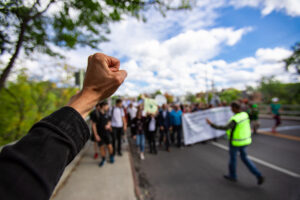
The United States was born out of a protest, and we still have the right to protest injustices or problematic issues. However, you can’t protest in any manner you please. Nowadays, we can’t just pour tea into Boston Harbor if we’re upset with the government, and when you act illegally during a protest, it’s easy for your message to get lost in the medium.
In an effort to help individuals understand their rights when it comes to protesting so that they don’t need to hire a criminal defense attorney to defend their actions in court, we want to use today’s blog to take a closer look at how you can legally protest in Minnesota.
Legally Protesting In Minnesota
We’re going to speak in generalities here simply because most cities have specific laws regarding how you can legally protest, so it’s very important that you look up information specific to the area where you’ll be conducting your protest. Even the rules between Minneapolis and St. Paul differ slightly, so just be sure you do your due diligence to ensure that everything remains lawful and peaceful so that your message comes across as intended.
Let’s use St. Paul as an example when talking about legal protesting. In St. Paul, you do not need a permit to protest. As long as protesters remain on a sidewalk and are careful to follow all traffic and pedestrian signals, they can legally protest. Marchers will also need to allow enough space for normal pedestrian traffic and not unreasonably obstruct or deny passage to any other passers-by. If they fail to do this, it can be considered an unlawful assembly, and if they do not comply or disperse as directed by police, arrests may be made.
While a permit is not required for small protests on the sidewalk, oftentimes a permit makes the protest run much smoother. A permit is required if you’re planning a march, a parade or a stationary event that causes an interruption in the normal use of public streets or sidewalks. Permits will also need needed if the protest is taking place at city parks or certain non-city parks or plazas that are managed by the General Services Administration. These permits are pretty easy to get, and the city can’t deny them for frivolous reasons. As the city of St. Paul notes, “A permit cannot be denied because the event is controversial or will express unpopular views.”
The city may have some requirements and rules when granting these permits. For example, they may change the route for traffic or safety purposes, and they usually don’t allow sound amplifying devices. There are also rules on the dimensions and materials used to create any signage that will be displayed during the protests. For example, “Saint Paul legislative code section 366A.14 requires that a pole or stick made of lumber, wood, or similar material and used to display a sign be ¼ inch or less in width, or if not generally rectangular in shape, not more than ¾ inch at its thickest dimension.”
It’s also worth noting that you can’t just say anything during a demonstration. Although you have the right to free speech, speakers or protesters can be arrested for incitement if they specifically advocate for violence or illegal actions.
Finally, we want to make it very clear that you cannot block the flow of traffic for your demonstration without a specific permit in place. Blocking traffic is not only illegal, but it’s incredibly dangerous. Vehicles do not have the right to run you over for blocking traffic, but you’re going to lose that game of chicken, and you’re also in violation of the law, so don’t think everyone will view you in a sympathetic light. There are much better ways to get your message across and get people to support your side than by blocking traffic.
If you need legal help because you ran afoul with the law during a protest, or you need help for a more common criminal matter, reach out to Avery and the team at Appelman Law Firm today at (952) 224-2277.





